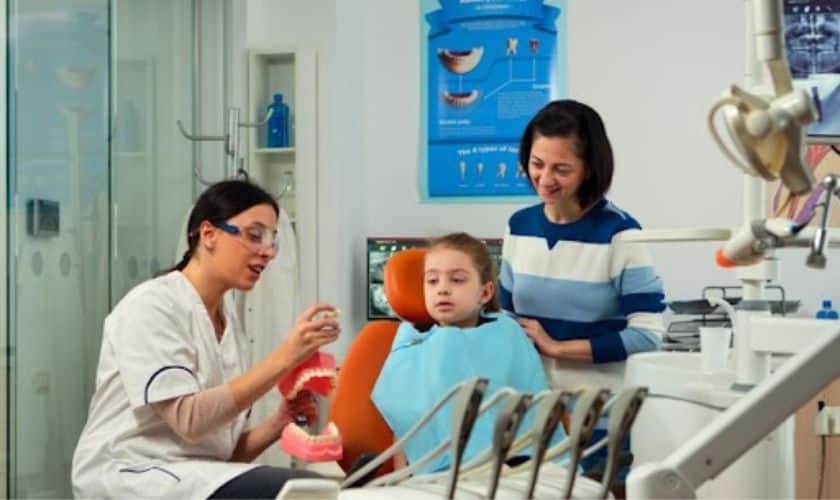Published on June 28, 2023

Welcome to the world of family dentistry, where smiles are nurtured, and oral health is prioritized for every member of your family. With our comprehensive and compassionate approach, we understand the unique needs of patients of all ages. From preventive care to specialized treatments, our family dentistry services are designed to promote oral health, instill good dental habits, and create a positive dental experience for everyone. Whether it’s your child’s first dental visit or a routine check-up for a family member, our dedicated team is committed to providing gentle, personalized care to help build lifelong smiles and ensure optimal oral health for your entire family.
What is Different About Family Dentistry?
A family dentist differs from other dental specialists in providing comprehensive oral care for patients of all ages, from children to adults. They are equipped to address each family member’s unique dental needs and concerns, offering a wide range of services, including preventive care, routine check-ups, dental cleanings, restorative treatments, and even orthodontic care. Family dentists understand the importance of building long-term relationships with their patients and strive to create a comfortable and friendly environment that caters to the entire family. They are experienced in handling diverse dental conditions and are well-versed in the specific dental requirements of different age groups.

Procedures adopted by a Family Dentist
A family dentist adopts various procedures to cater to the oral health needs of patients of all ages. Some common procedures include:
1. Dental Examinations: Family dentists perform comprehensive dental exams to assess the overall oral health of each family member. It includes examining teeth, gums, and oral tissues for signs of decay, disease, or abnormalities.
2. Dental Cleanings: Regular dental cleanings and professional teeth scaling are essential to remove plaque, tartar, and surface stains. Family dentists perform thorough cleanings to promote oral hygiene and prevent dental issues.
3. Preventive Care: Family dentists emphasize preventive care, including dental sealants, fluoride treatments, and oral health education. They guide proper brushing and flossing techniques and advice on diet choices for maintaining healthy teeth.
4. Restorative Treatments: Family dentists offer a range of restorative treatments such as fillings, crowns, bridges, and dentures to repair damaged or replace missing teeth.
5. Orthodontic Care: Some family dentists provide orthodontic services, including braces and aligners, to correct teeth misalignment and bite issues.
6. Pediatric Dentistry: Family dentists are skilled in handling pediatric dental care, including infant oral health, dental sealants, and early orthodontic assessments.
7. Emergency Dental Care: Family dentists are prepared to handle dental emergencies promptly, providing immediate relief and necessary treatments for dental injuries or severe tooth pain.
Overall, family dentists focus on comprehensive oral care, promoting preventive measures, and offering a wide range of dental treatments to meet the unique needs of each family member.
Upsides of Family Dentistry
1. Comprehensive Care: Family dentistry offers a wide range of dental services for patients of all ages, including children, adults, and seniors. It means that your entire family can receive dental care conveniently under one roof, eliminating the need for multiple dental providers.
2. Personalized Approach: Family dentists understand that each family member has unique dental needs and concerns. They provide personalized care tailored to each individual, considering age, oral health history, and specific dental requirements.
3. Preventive Care: Family dentists emphasize preventive dental care, focusing on regular check-ups, cleanings, and oral hygiene education. Detecting and addressing dental issues early on helps prevent future more complex and costly problems.
4. Continuity of Care: Family dentists develop long-term relationships with their patients, often caring for them from childhood through adulthood. This continuity of care fosters trust, comfort, and a deeper understanding of each patient’s oral health history and needs.
5. Convenience: With a family dentist, you can schedule multiple appointments on the same day or back-to-back, saving time and minimizing disruptions to your family’s busy schedule. Family dentists often offer flexible hours and accommodate emergencies, ensuring prompt care when needed.
How often should I visit a Family Dentist?
Frequent visits to a family dentist depend on individual oral health needs. In general, visiting a family dentist every six months is recommended for routine check-ups and cleanings. Regular visits allow the dentist to monitor your oral health, detect issues early, and provide preventive care. However, some individuals may require more frequent visits if they have specific oral health conditions or a higher risk of dental problems. Your family dentist will assess your oral health and recommend a visit schedule tailored to your needs. Following their guidance to maintain optimal oral health and address any concerns promptly is important.
Source : FOX 4 Now
In conclusion, Family dentistry offers comprehensive oral care for patients of all ages, ensuring the entire family’s well-being and long-term oral health. With a focus on preventive care, early intervention, and personalized treatment plans, family dentists create a comfortable and welcoming environment for patients, fostering a lifetime of healthy smiles and dental wellness. Trust the power of family dentistry for your family’s oral healthcare needs.
FAQs:
1. When should my child start visiting the dentist?
It is recommended to take your child for their first dental visit around the age of one or when their first tooth erupts.
2. Does family dentistry include orthodontic treatment?
Family dentistry offer orthodontic services, including braces and Invisalign, to correct teeth alignment issues for children and adults.
3. What options are available for replacing missing teeth?
Family dentists offer various options, such as dental implants, bridges, and dentures, to replace missing teeth, depending on the patient’s needs and preferences.
4. How often should I schedule dental check-ups for my family?
It is generally recommended to schedule dental check-ups every six months for routine preventive care, although the frequency may vary based on individual dental health needs.
5. Are family dentists experienced in handling dental emergencies?
Yes, family dentists are trained to handle dental emergencies. They can provide immediate care for toothaches, broken teeth, and other dental emergencies, ensuring prompt relief and treatment.
